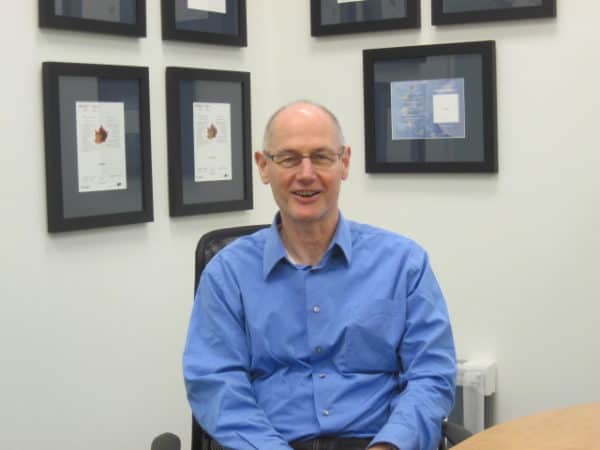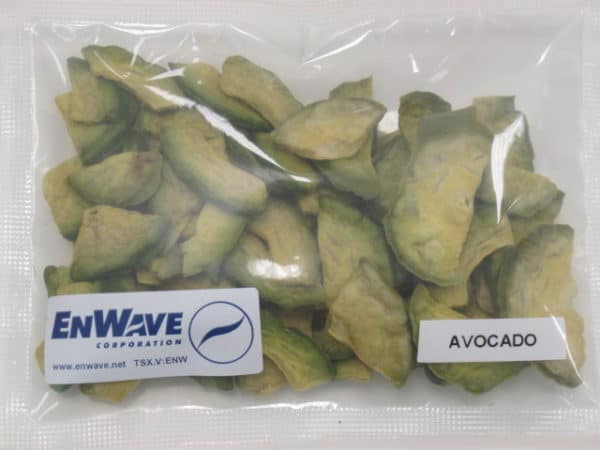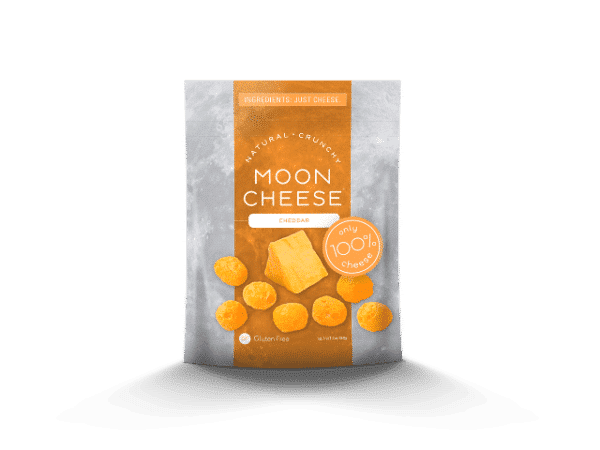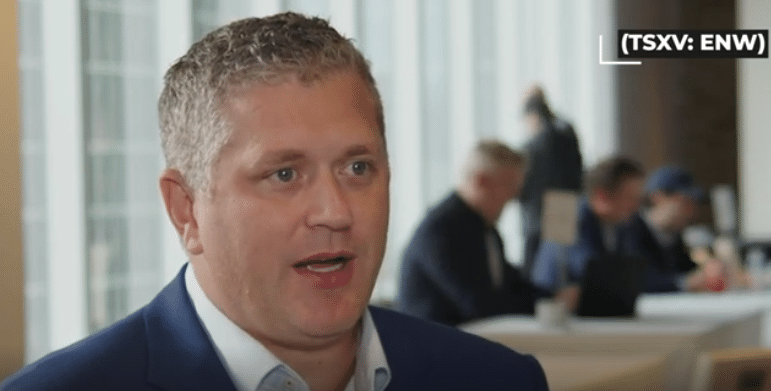EnWave co-CEO and Chairman Dr. Tim Durance talks to Cantech Letter

 Google search. The smartphone. The driverless car. The best of technology not only changes the way we do something forever, it makes what we did before seem instantly archaic. Anyone want to go back to hunting for a payphone, or using AltaVista or Webcrawler?
Google search. The smartphone. The driverless car. The best of technology not only changes the way we do something forever, it makes what we did before seem instantly archaic. Anyone want to go back to hunting for a payphone, or using AltaVista or Webcrawler?
The way we taste, smell and derive nutrition from dried foods may be about to undergo a change that will make what came before it seem almost inedible. Vancouver-based EnWave (TSXV:ENW), which was born from technology developed at the University of British Columbia, has patented a drying process that allows for high nutritional retention and preserves natural flavours and colors in a way we haven’t seen before.
EnWave is looking to shake up a massive global foods industry with its REV™ technology, which aims to replace inferior methods such a spray or air drying. To say the industry is paying attention to what the relatively tiny company is doing would be an understatement. Last year alone, the company struck deals with Bonduelle, the world’s leading producer of frozen and canned vegetable and Hormel, a global food giant that posted revenue of more than $8.7-billion in 2013. This comes in addition to partnerships the company has with household names such as Nestlé, Kellogg’s, and Sun Maid.
And after years of perfecting its process, EnWave is now commercial: a new healthy cheese snack product called Moon Cheese® is selling at a number of Kroger grocery stores, and the company has signed nine other royalty-bearing commercial licenses.
Cantech Letter sat down with Dr. Tim Durance to talk about what’s next for the company.
Dr. Durance, can you explain how and why EnWave was formed?
EnWave Corporation was formed under the Canada Business Corporations Act on July 14, 1999 after a group of local Vancouver business people (including current Westport Innovations CEO, Mr. David Demers) discovered the innovations that were being developed regarding Radiant Energy Vacuum (“REV™”) dehydration technology at the University of British Columbia (“UBC”). At the time, REV™ technology was in the very early stage of development, but needed to be taken public in order to generate the necessary capital to advance the technology. The first few years were a struggle, but a colleague and I bootstrapped to keep the company afloat until the mid-2000’s, when a new leadership group joined the Company. We subsequently raised the necessary capital to commercialize our potentially disruptive technology.
We are now a Vancouver-based industrial technology company that offers commercial-scale dehydration machinery for applications in the food and pharmaceutical spaces. Our proprietary technology platforms apply microwave energy under vacuum to offer flexible, efficient processing suitable for sensitive food products and biomaterials.
What problem is EnWave trying to fix?
EnWave’s REV™ dehydration technology provides a superior alternative for temperature-sensitive materials to the incumbent dehydration technologies that include freeze drying, air drying and spray drying. REV™ creates a gentle, low temperature drying process that enables high nutritional retention and the preservation of natural colors and strong flavors for food applications. In the pharmaceutical industry, REV™ has proven to retain the efficacy of numerous biomaterials after dehydration, with shorter processing times and long shelf lives. EnWave’s mission is to establish REV™ technology as the new global dehydration standard: faster and cheaper than freeze drying, with better quality than air drying or spray drying. By creating this value proposition, we can justify the implementation of our core business model, which is a licensing royalty model.

Is there a pull from the industry for better dried food?
Absolutely. We have been approached by over 100 companies to evaluate different potential product applications and continue to work with over 50 companies on a testing or commercial basis. Consumer trends in the food industry are demanding companies to re-evaluate the quality of their healthier product options. REV™ has been shown to substantially increase the quality of many healthy dehydrated food products that can now be produced in a more economical way. In the past, prior to the availability of REV™, the cost of processing higher quality dehydrated food products via freeze drying was a major obstacle for these companies to offer higher value goods.
I have tried a range of your products, from strawberries to cheese, and their taste is truly remarkable. But can you give me some examples of how they might improve products beyond just the way they taste?
Well for food products, REV™ will preserve a high level of nutrients due to the low drying temperatures and protection from oxidation during processing. In some cases the food applications will either retain their natural shape or adopt a ‘puffing’ characteristic caused by the vacuum involved in the process. The porosity of many products dehydrated using REV™ technology often increases, which can also be advantageous for increasing water uptake in a number of applications such as soup ingredients and absorbent polymers.
You are now moving out of R&D and into commercialization. Can you tell us about your first product to hit the shelves?
Although it took us longer than expected to reach a commercialization inflection point, we had a major breakout in 2013 signing five new royalty-bearing commercial licenses. So far in 2014, we have signed three additional licenses bringing the total number of commercial licensees to ten. We also established a joint partnership in the U.S. to market and sell a new 100% all-natural, healthy cheese snack product under the Moon Cheese® brand. That product is now being sold via a number of Kroger grocery stores, including Quality Food Centers and Fred Meyer, in the Pacific Northwest with plans to expand the distribution over the coming months. We subsequently signed a second license with another company to market REV™ cheese snacks under private label brands in the US and Latin America. These opportunities could be big drivers of near term revenue for our Company. Our other commercial licensees have already begun to sell a number of REV™-dried fruits, vegetables, herbs and meat products in a variety of forms as well.

You have made great strides in making industry partnerships. Can you talk a bit about that?
Yes, the two major commercial licensees that were confirmed in 2013 were Bonduelle, the world’s leading producer of frozen and canned vegetables, and Hormel, a major U.S. producer of processed meat products that did over USD$8 billion in revenue last year. Bonduelle has developed a line of ‘dehydro-frozen’ vegetable products that when cooked or thawed taste more like a fresh product. This is a major revolution for potential product applications that Bonduelle has considered for some time, but are now enabled to deliver. EnWave has committed to deliver a commercial-scale REV™ machine to Bonduelle by the end of 2014 and has plans to design and potentially deliver an even larger machine to them in 2015. Hormel developed a number of dried meat snack products and successfully conducted a trial launch on the product line in the U.S. in early 2014. We expect them to make a purchase order decision on large scale REV™ machinery in the summer of 2014, which would indicate that they have larger commercial aspirations for their protein-rich snacks.
Additionally, we also have a full R&D pipeline and have signed agreements in the past with companies that include Nestlé, Kellogg’s, Ocean Spray, RJ Reynolds, Merck and Sun Maid Growers. The beauty of these R&D relationships is that our collaborators typically pay a fee to lease lab-scale machinery to conduct product development at their own facilities with their own staff. This dramatically reduces the cost associated with product development and allows EnWave to engage with a myriad of companies at once. We anticipate a number of new commercial opportunities to potentially be confirmed in the second half of 2014 to complement our existing commercial relationships.
What happens if one of your industry partners has a huge hit with one of your products? What is your capacity to expand?
Well, for starters we would make a lot of money! For each standard commercial scale machine (100kW-120kW) in operation we guide an annual royalty revenue potential of between CDN$300,000 to CDN$900,000 at full utilization. If one of our larger partners goes national with a successful product, they will need several standard commercial scale machines to adequately handle the needed capacity. We would collect the profit margin on selling the machinery and then collect a royalty, either 3-5% on the wholesale value of the product being sold or a set fee per pound of production. The royalty streams would build as an annuity for the Company. If our joint partnership has a huge hit with the dried cheese snack product, we can expect a revenue range of USD$12 to 15 million in top line revenue per 100kW REV™ machine at full utilization with a 10-20% pre-tax profit and a 5% royalty paid back to EnWave of the revenue. The profits from the joint partnership will be split 51% to EnWave based on the ownership structure. We currently have the ability to deliver approximately 10 commercial plants per year, but if the demand increases we could expand our capacity to about 20 commercial plants per annum. We have the ability to build these plants either in North America via EnWave’s talented engineering group and out-source partners, or in Europe via our machine building subsidiary, Hans Binder Maschinenbau GmbH.
How much intellectual property does EnWave possess?
EnWave has established a comprehensive patent portfolio that includes both technological design and process patents. There are currently 16 patents in the suite that have either been granted or have been filed through the International PCT process. We continue to target additional patentable innovations to further strengthen our position and the majority of our patents do not expire until the late 2020’s.
I know it might be hard to get a handle on the size of this space, but what do you think is the size of your immediately addressable market?
We have conducted extensive market research to identify the total consumer value of products sold that include components that have either been freeze dried, air dried or spray dried on an annual basis. From our research and analysis of industry and company reports, approximately USD$400 billion of products that have a dehydrated component are sold on an annual global basis. This is an important number as we often apply a royalty to the wholesale value of our commercial licensee’s products. Additionally, about USD$1.8 billion is spent on new freeze drying equipment per annum. This illustrates a consistent investment in new dehydration processing equipment.
What does EnWave hope to accomplish in the next 12-18 months?
EnWave management will continue to work hard to secure additional royalty-bearing commercial licenses, machine orders and research collaborations in an effort to get the Company to a cash-flow breakeven scenario as fast as possible. We are currently well financed and we certainly have adequate opportunities to potentially reach that scenario within the next 9-18 months. We are also focused on building our joint partnership sales throughout 2014, which we view as a potential significant near term driver of revenue for EnWave.
Disclosure: EnWave is an annual sponsor of Cantech Letter.
Nick Waddell
Founder of Cantech Letter
Cantech Letter founder and editor Nick Waddell has lived in five Canadian provinces and is proud of his country's often overlooked contributions to the world of science and technology. Waddell takes a regular shift on the Canadian media circuit, making appearances on CTV, CBC and BNN, and contributing to publications such as Canadian Business and Business Insider.

